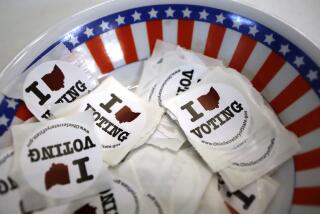School Vouchers Win Backing of High Court
WASHINGTON â The Supreme Court opened the door Thursday for the use of taxpayer money to send students to church schools, ruling that Ohioâs voucher plan does not violate the Constitutionâs ban on an âestablishment of religion.â
The 5-4 decision, coming on the last day of this yearâs term, is a major victory for the âschool choiceâ movement and probably the most important high court ruling on aid to parochial schools in nearly 30 years.
The ruling upholds Ohioâs tuition grant of $2,250 that families in Cleveland can spend at private schools. More than 96% of parents who took the money enrolled their children in religious schools.
Both sides in the debate predict that the ruling will trigger a push for vouchers and other forms of school choice around the country.
Chief Justice William H. Rehnquist said the state aid program was designed to help low-income children, not to promote religion. Moreover, the flow of money depends on âtrue private choice,â he said.
âNo reasonable observer would think a neutral program of private choice, where state aid reaches religious schools solely as a result of numerous independent decisions of private individuals, carries with it the imprimatur of government endorsement,â the chief justice said.
President Bush and Republican leaders on Capitol Hill praised the ruling and said it will give parents more choices for their childrenâs education.
âThis decision clears the way for other innovative school choice programs so that no child in America will be left behind,â Bush said.
âTodayâs historic Supreme Court decision ... can transform the education landscape in our country,â added Education Secretary Rod Paige. It âlifts the constitutional cloud that has been hanging over school choice programs for years and will open the doors of opportunity to thousands of children who need and deserve the best possible education.â
The âschool choiceâ advocates, most of whom are critics of the public schools, say parents, especially those in big cities, need more options for their children. Among the most attractive and available options are the Roman Catholic schools. Many of them have open seats and charge low tuition.
But until now, many state officials have hesitated to propose using public funds to send children to these schools because of the legal barrier separating church and state.
Currently, only Milwaukee and Cleveland offer parents vouchers, but Republican governors in several states have expressed interest in the idea. In Florida, Gov. Jeb Bush has created a small voucher program that is targeted at children who attend âfailingâ public schools.
Twice in the last decade, Californiaâs voters, by 2-1 margins, rejected voucher proposals on the state ballot. Two years ago, 71% of voters opposed the idea of authorizing a $4,000 annual state subsidy per child to pay for private schools. Vouchers have also lost in statewide votes in Washington, Michigan and Maryland.
In opinion polls, suburban voter in those states say they were reasonably satisfied with the public schools and opposed spending millions of dollars in tax funds for private schools.
For the Supreme Court, Thursdayâs ruling culminates the long but steady shift away from the doctrine of separation of church and state.
In 1947, a unanimous court quoted Thomas Jefferson and said the 1st Amendment creates a âwall of separation between church and state.â That means, Justice Hugo Black said, that âno tax in any amount, large or small, can be levied to support any religious activities or institutions, whatever they may be called, or whatever form they may adopt to teach or practice religion.â
This stood as the law for decades. In 1973, the court struck down a New York law, similar to Ohioâs, that gave tuition subsidies to parents who sent their children to parochial schools.
But since Rehnquist became chief justice in the mid-1980s, the court has moved away from the strict separation of church and state. On several occasions, it has upheld a limited use of public money in parochial schools.
For example, the court two years ago approved the use of federal funds to buy computers in both public and parochial schools. The justices also said public reading tutors can work in parochial schools to help disadvantaged children.
Thursdayâs ruling goes a step further because it upholds the use of tax money to pay for a child to leave a public school and enroll in a parochial school.
Rehnquistâs opinion did not officially overturn the 1973 ruling, but he made clear that voucher plans can stand so long as they offer parents an array of choices. In Cleveland, they can choose a public magnet school or a community school, or use the voucher money for a private or parochial school.
âWe have never found a program of true private choice to offend the establishment clause,â he wrote.
Rehnquistâs opinion does not say a voucher program must be targeted at low-income children or limited in scope. The ruling appears to clear the way for a statewide voucher program that offers tuition subsidies to all families with schoolchildren.
The parochial aid issue split the court along the familiar conservative-liberal lines. Rehnquistâs opinion was joined in full by Justices Sandra Day OâConnor, Antonin Scalia, Anthony M. Kennedy and Clarence Thomas.
In a concurring opinion, OâConnor stressed that Ohio does not send public money directly to Catholic schools. It sends vouchers to parents, she noted. Moreover, the voucher program in Cleveland is small, she said--a mere $8.2 million. Consider that $45 billion in federal funds went to religious hospitals in 1998, OâConnor said, yet no one argues that this spending bridges the wall of separation between church and state.
In a powerful concurring opinion, Thomas invoked Frederick Douglass, the black abolitionist, who said: âEducation means emancipation. It means light and liberty.â Thomas added, âToday, many of our inner-city public schools deny emancipation to urban minority students.â The 1st Amendment should not be read to âconstrain a stateâs neutral efforts to provide greater educational opportunity for underprivileged minority students.â
Ohioâs state school Supt. Susan Zelman had appealed when a lower court struck down the voucher plan in a lawsuit that was paid for by the National Education Assn. but brought on behalf of a taxpayer named Doris Simmons-Harris. So the case was known as Zelman vs. Simmons-Harris, 00-1751.
Justice David H. Souter, speaking for the four dissenters, called the ruling a âdramatic departureâ from the core principle in the âestablishment clauseâ--that the government may not spend tax funds for the teaching of religion. He was joined by Justices John Paul Stevens, Ruth Bader Ginsburg and Stephen G. Breyer.
In separate dissents, Stevens and Breyer also worried about the prospect of âreligious strifeâ if Roman Catholic, Protestant, Jewish and Muslim groups compete for government subsidies.
Leaders of the public schools and the two major teachersâ unions--the American Federation of Teachers and the NEA--denounced the ruling and said a voucher plan will drain money from the public schools to benefit the few who go to private schools.
âJust because vouchers may be legal in some circumstances doesnât make them a good idea,â said NEA President Bob Chase.
Barry Lynn, the executive director of Americans United for Separation of Church and State, said the Rehnquist opinion takes a âwrecking ballâ to the wall of separation between church and state.
âThis is clearly the worst church-state decision in the past 50 years,â Lynn said. âUnfortunately, the court has approved forcing taxpayers to pay for religious indoctrination. America, watch your wallet or it may end up in the collection plate.â
Besides allowing more public aid to parochial schools, Thursdayâs ruling also represents a victory for President Bushâs âfaith-based initiative.â
Bush wants government money to support and encourage church-based programs that, among other things, offer counseling for drug abusers, prisoners and pregnant teens.
More to Read
Sign up for Essential California
The most important California stories and recommendations in your inbox every morning.
You may occasionally receive promotional content from the Los Angeles Times.











